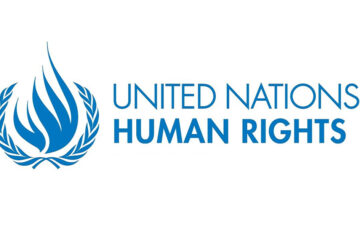In a show of solidarity and support for rural women currently facing criminal charges for defending their land rights, members of the World March of Women-Pilipinas, together with Katarungan, Focus on the Global South, and iDefend, gathered at the Department of Justice in Manila, March 8, International Women’s Day. Members of the farmers’ group based in Sumalo, Bataan “surrendered” to the DOJ amidst estafa charges even as “We fear that the criminalization of eight mothers and a male farmer in Sumalo as well as more rural women across the country will render more daughters vulnerable to sexual exploitation,” noted Jean Enriquez, convenor of the World March of Women-Pilipinas.
The syndicated estafa case is the most recent of the acts of harassment against them since they were ejected from the land they till in October 2022, according to a statement of Katarungan, a support and advocacy group on peasant and land rights.
On January 6, 2023, SANAMABASU (Samahan ng mga Nagkakaisang Mamamayan ng Barangay Sumalo ) received a Resolution upholding the case of syndicated estafa filed by Riverforest Development Corporation (RDC) against nine of their members—eight females and one male. Four of the women are senior citizens aged 72, 69, 68 and 61 years old respectively. Syndicated estafa is a non-bailable offense if the amount in question exceeds P100,00.00. In the case of the accused, the alleged amount is P148,000. The farmer-members of SANAMABASU have been locked in a decades-long struggle with RDC on a 213,000-hectare land in Barangay Sumalo, Hermosa, Bataan, ever since the farmers petitioned in1988 to have the land be reformed and re-distributed under the government’s Comprehensive Agrarian Reform Program.
Janel Geconcillo, president of PKKK (national coalition of women from the countryside), lambasted the neo-liberal economic policies of government as it perpetuates the historical bias against the interests of rural women and farmers in general. “Economic policies biased in favor of opening our markets to imported agricultural products even as the agriculture sector continues to reel from lack of support, corruption, and incomplete implemen tation of agrarian reform. Meanwhile, rural women carry the burden of household chores, rural production, while being part of people’s organizations fighting for our rights,” Geoncillo said.
Jean Enriquez, National Coordinator of WMW-Pilipinas and the Coalition Against Trafficking in Women – Asia Pacific (CATW-AP) stated that the denial of land rights as women’s rights has rendered women vulnerable to trafficking and prostitution. “We have been assisting young women victimized in so-called high-class prostitution following the incarceration of parents who are farmers defending their land,” she explained.
Echoing the effect of criminalizing rural women rights defenders, Ana Maria R. Nemenzo of Woman Health Philippines asserted that “Corporate land grabbing violates rural women’s rights to land and livelihood, their sexual and reproductive health rights, rendering them vulnerable to abuse and violence, and bringing about hunger and malnutrition that could cause a generation of malnourished and stunted children. All violence against women must end.”
“In celebrating Women’s Day, we celebrate the strength and persistence of rural and indigenous women to assert their rights to their land and ancestral domain even as they face the different challenges brought by climate crisis, increase in food prices, and land grabbing, including threats, red tagging and fabricated legal cases filed to silence them. We salute them and call for the end of assault against women land rights defenders,” said Judy Pasimio of LILAK (Purple Action for Indigenous Women’s Rights).
“The rights of women in farming and fishery are guaranteed both by the 1987 Constitution and the Magna Carta of Women. They deserve to be regarded as equal contributors to the economy, capable decision-makers with equal agency, and live as leaders not confined solely in their households, but most especially in their communities. Government needs to address the genuine development of agriculture and afford women farmers and fisherfolk equal recognition, and to listen to the voices and demands of women in agriculture,” said Jelen Paclarin of Women Legal and Human Rights Bureau (WLB).
Not only rural women have been affected by lack of support from government and its one-sided policies, but also women from the labor sector.
“In the middle of rising costs on goods and primary services, land grabbing against farmer and ordinary people by companies continues unabated in rural and urban spaces. We are denied the right to live in peace, with decent livelihood in farming and the places we live in. Worse, those who resist these violent acts are themselves arrested for fighting for their land, many of them women. What should be prioritized is how to improve the lives of women and the people, not the blatant theft of ancestral, rural, and urban land by large corporations,” noted Nicey Coronacion of Sentro ng mga Nagkakaisa at Progresibong Manggagawa.
For women in the migrant sector, women farmers’ issues are issues of women OFWs. “A big portion of our women migrant workers come from the countryside. We see and foresee more of them thinking of and deciding to migrate, becoming more vulnerable to illegal recruitment and human trafficking, in their desire to help finance their families’ immediate and basic needs of food, shelter, clothing, health and education. These persisting issues of farmers also prevent our women OFWs from reintegrating and reuniting with their families. We are one with rural women in their struggle to fight for their rights,” underscored Ellene Sana of Center for Migrant Advocacy (CMA).
Meanwhile, WMW-Pilipinas called the attention of the president who is the direct overseer of agriculture concerns. “President Ferdinand Marcos Jr, currently the head of the Department of Agriculture, has recently extended a hand of reconciliation to his critics and opponents. For women, especially from the agriculture sector, who have been facing one crisis after another, reconciliation must mean that the president aligns his leadership with the interest of the oppressed and not with corporate interest which have long harassed farmers only fighting for their right to till the land and benefit from their own labor,” said WMW-Pilipinas in a statement. The grassroots movement called on the President to be replaced by an able and pro-farmer secretary in the Department of Agriculture.
They brought with them makeshift jailbars to dramatize the oppression of rural women farmers, being reminded by the dramatic scene in the television series Maria Clara at Ibarra whenever the women characters feel the multi-layered oppression that persists then and now. The jail bars also illustrate how numbers of rural women are now facing jail terms for asserting their land rights. Other women’s rights defenders criminalized are staunch Duterte-critic Senator Leila de Lima and anti-trafficking advocate Sally Ujano.
Wearing purple rural women’s attires, the women leaders also chanted and sounded drums to these words: “Kami ay Peminista, Hindi Terorista; Bigas at Rosas, Hinding hindi lunas ang Dahas!”
![]()



0 Comments